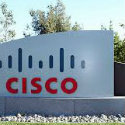Cisco clobbered with $1.9B patent bill
US District Court Judge orders tech giant to cough up in cybersecurity patent dispute with Centripetal. Cisco says it will appeal.

Small cybersecurity firm Centripetal Networks, based in Virginia, won big-time in its patent dispute with Cisco.
Judge Henry Morgan, after presiding over an eight-week "virtual" bench trial in the Eastern District Court of Virginia, ordered Cisco to pay $1.9 billion in damages – one the biggest patent awards in US history – for infringing on four patents. An infringement claim on a fifth patent was not upheld, however.
The payout was 2.5 times more than the $755.8 million the District Court judged Cisco to owe Centripetal in actual damages. Morgan said he bumped up the award because the tech giant's patent infringements were "willful and egregious."
Morgan was scathing about Cisco's handling of the dispute. In a 167-page decision on the "Centripetal Networks Inc v Cisco Systems" case, he said it was "not a close call." He cited inconsistencies in Cisco's evidence and technical documents that "proved Centripetal's case."
For good measure, Morgan added that Cisco – with regard to the four patents – "did not advance any objectively reasonable defenses at trial."
The District Court further ruled that Cisco must pay the startup a 10% royalty on some of its products over the next five years. The percentage rate drops to 5% for the following three years.
"With this judgment, the court rejected the primitive doctrine that might makes right," Paul Andre, a lawyer for Centripetal, said in a statement. "This is a significant win for all small, innovative companies."
Centripetal filed its patent infringement lawsuit against Cisco in February 2018.
Fighting talk
In a prepared statement made available to media outlets, Cisco unequivocally rejected Morgan's assessment of the case.
"We are disappointed with the trial court's decision given the substantial evidence of non-infringement, invalidity and that Cisco's innovations predate the patents by many years," said Cisco. "We look forward to the Federal Circuit's review on appeal."
This was already a difficult year for Cisco before the US District Court ruling in Virginia.
Revenues dropped 9% year-on-year in its fourth fiscal quarter (spanning May to July), to $12.2 billion, as customers reined in spending.
Related posts:
— Ken Wieland, contributing editor, Light Reading
About the Author(s)
You May Also Like




_International_Software_Products.jpeg?width=300&auto=webp&quality=80&disable=upscale)







